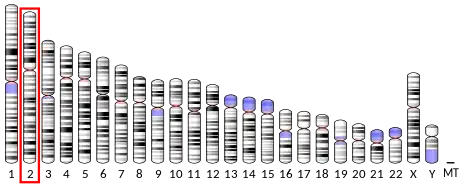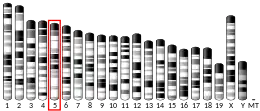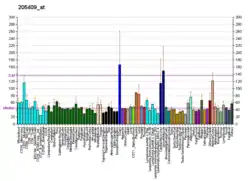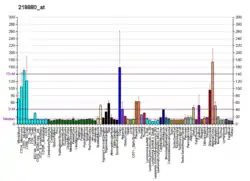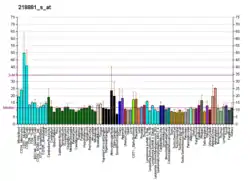Fos-related antigen 2 (FRA2) is a protein that in humans is encoded by the FOSL2 gene.[5]
Function
The Fos gene family consists of 4 members: c-Fos, FOSB, FOSL1, and FOSL2. These genes encode leucine zipper proteins that can dimerize with proteins of the JUN family, thereby forming the transcription factor complex AP-1. As such, the FOS proteins have been implicated as regulators of cell proliferation, differentiation, and transformation.[5]
See also
References
- 1 2 3 GRCh38: Ensembl release 89: ENSG00000075426 - Ensembl, May 2017
- 1 2 3 GRCm38: Ensembl release 89: ENSMUSG00000029135 - Ensembl, May 2017
- ↑ "Human PubMed Reference:". National Center for Biotechnology Information, U.S. National Library of Medicine.
- ↑ "Mouse PubMed Reference:". National Center for Biotechnology Information, U.S. National Library of Medicine.
- 1 2 "Entrez Gene: FOSL2 FOS-like antigen 2".
Further reading
- Matsui M, Tokuhara M, Konuma Y, Nomura N, Ishizaki R (March 1990). "Isolation of human fos-related genes and their expression during monocyte-macrophage differentiation". Oncogene. 5 (3): 249–55. PMID 2107490.
- Molven A, Houge G, Berger R (November 1996). "Chromosomal assignment of the human gene encoding the Fos-related antigen-2 (FRA2) to chromosome 2p22-p23". Genomics. 38 (1): 72–5. doi:10.1006/geno.1996.0593. PMID 8954781.
- Outinen PA, Sood SK, Pfeifer SI, Pamidi S, Podor TJ, Li J, Weitz JI, Austin RC (August 1999). "Homocysteine-induced endoplasmic reticulum stress and growth arrest leads to specific changes in gene expression in human vascular endothelial cells". Blood. 94 (3): 959–67. doi:10.1182/blood.V94.3.959.415k20_959_967. PMID 10419887.
- Miyamoto NG, Medberry PS, Hesselgesser J, Boehlk S, Nelson PJ, Krensky AM, Perez HD (June 2000). "Interleukin-1beta induction of the chemokine RANTES promoter in the human astrocytoma line CH235 requires both constitutive and inducible transcription factors". Journal of Neuroimmunology. 105 (1): 78–90. doi:10.1016/S0165-5728(00)00195-8. PMID 10713367. S2CID 8547340.
- Ng DC, Shafaee S, Lee D, Bikle DD (August 2000). "Requirement of an AP-1 site in the calcium response region of the involucrin promoter". The Journal of Biological Chemistry. 275 (31): 24080–8. doi:10.1074/jbc.M002508200. PMID 10816578.
- Bamberger AM, Milde-Langosch K, Rössing E, Goemann C, Löning T (September 2001). "Expression pattern of the AP-1 family in endometrial cancer: correlations with cell cycle regulators". Journal of Cancer Research and Clinical Oncology. 127 (9): 545–50. doi:10.1007/s004320100255. PMID 11570575. S2CID 7184971.
- Udalova IA, Kwiatkowski D (November 2001). "Interaction of AP-1 with a cluster of NF-kappa B binding elements in the human TNF promoter region". Biochemical and Biophysical Research Communications. 289 (1): 25–33. doi:10.1006/bbrc.2001.5929. PMID 11708771.
- Benkoussa M, Brand C, Delmotte MH, Formstecher P, Lefebvre P (July 2002). "Retinoic acid receptors inhibit AP1 activation by regulating extracellular signal-regulated kinase and CBP recruitment to an AP1-responsive promoter". Molecular and Cellular Biology. 22 (13): 4522–34. doi:10.1128/MCB.22.13.4522-4534.2002. PMC 133906. PMID 12052862.
- Santalucía T, Christmann M, Yacoub MH, Brand NJ (September 2003). "Hypertrophic agonists induce the binding of c-Fos to an AP-1 site in cardiac myocytes: implications for the expression of GLUT1". Cardiovascular Research. 59 (3): 639–48. doi:10.1016/S0008-6363(03)00472-3. PMID 14499865.
- Beausoleil SA, Jedrychowski M, Schwartz D, Elias JE, Villén J, Li J, Cohn MA, Cantley LC, Gygi SP (August 2004). "Large-scale characterization of HeLa cell nuclear phosphoproteins". Proceedings of the National Academy of Sciences of the United States of America. 101 (33): 12130–5. Bibcode:2004PNAS..10112130B. doi:10.1073/pnas.0404720101. PMC 514446. PMID 15302935.
- Olsen JV, Blagoev B, Gnad F, Macek B, Kumar C, Mortensen P, Mann M (November 2006). "Global, in vivo, and site-specific phosphorylation dynamics in signaling networks". Cell. 127 (3): 635–48. doi:10.1016/j.cell.2006.09.026. PMID 17081983. S2CID 7827573.
External links
- FOSL2+protein,+human at the U.S. National Library of Medicine Medical Subject Headings (MeSH)
- FactorBook FOSL2
This article incorporates text from the United States National Library of Medicine, which is in the public domain.
This article is issued from Wikipedia. The text is licensed under Creative Commons - Attribution - Sharealike. Additional terms may apply for the media files.
